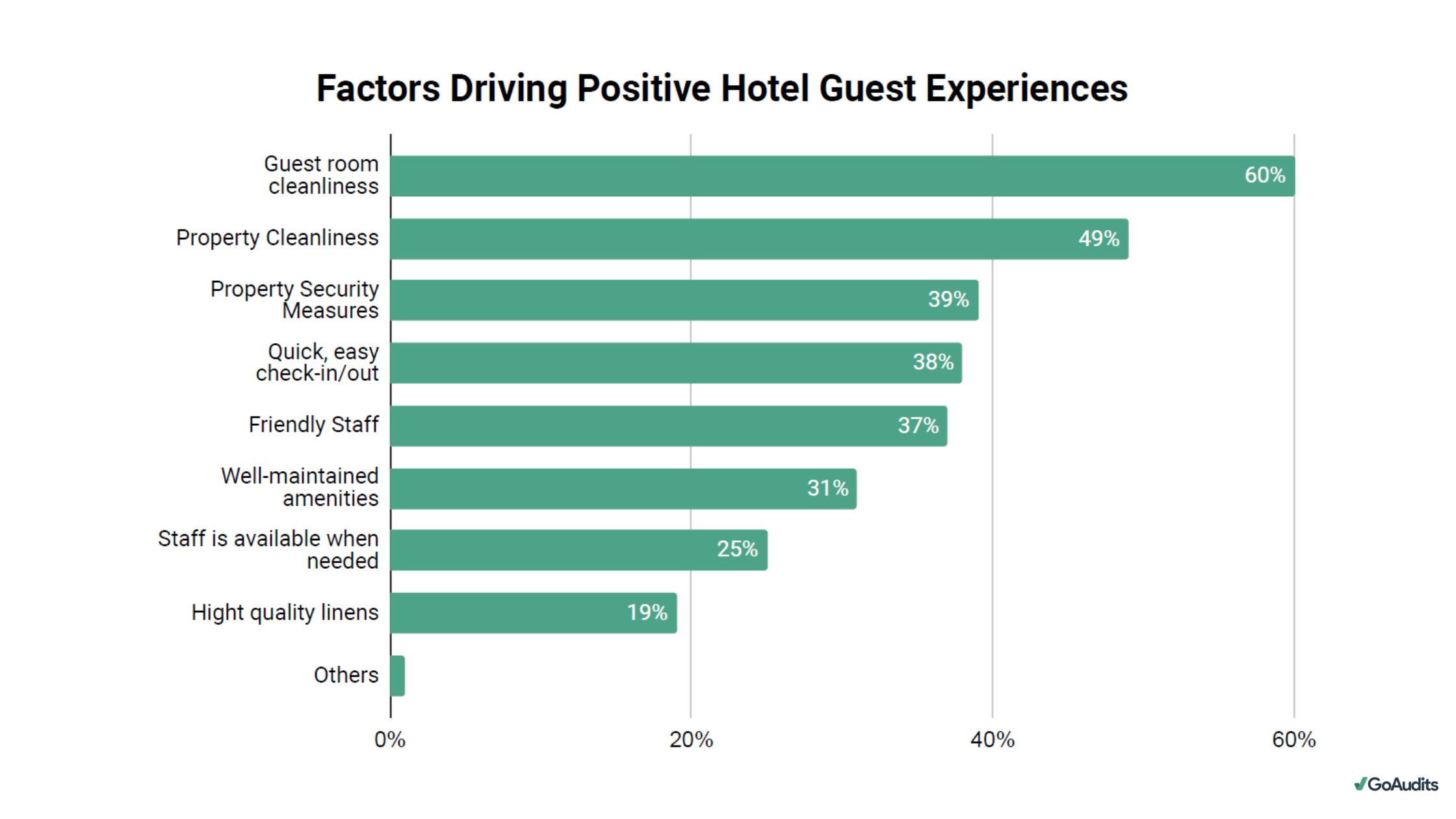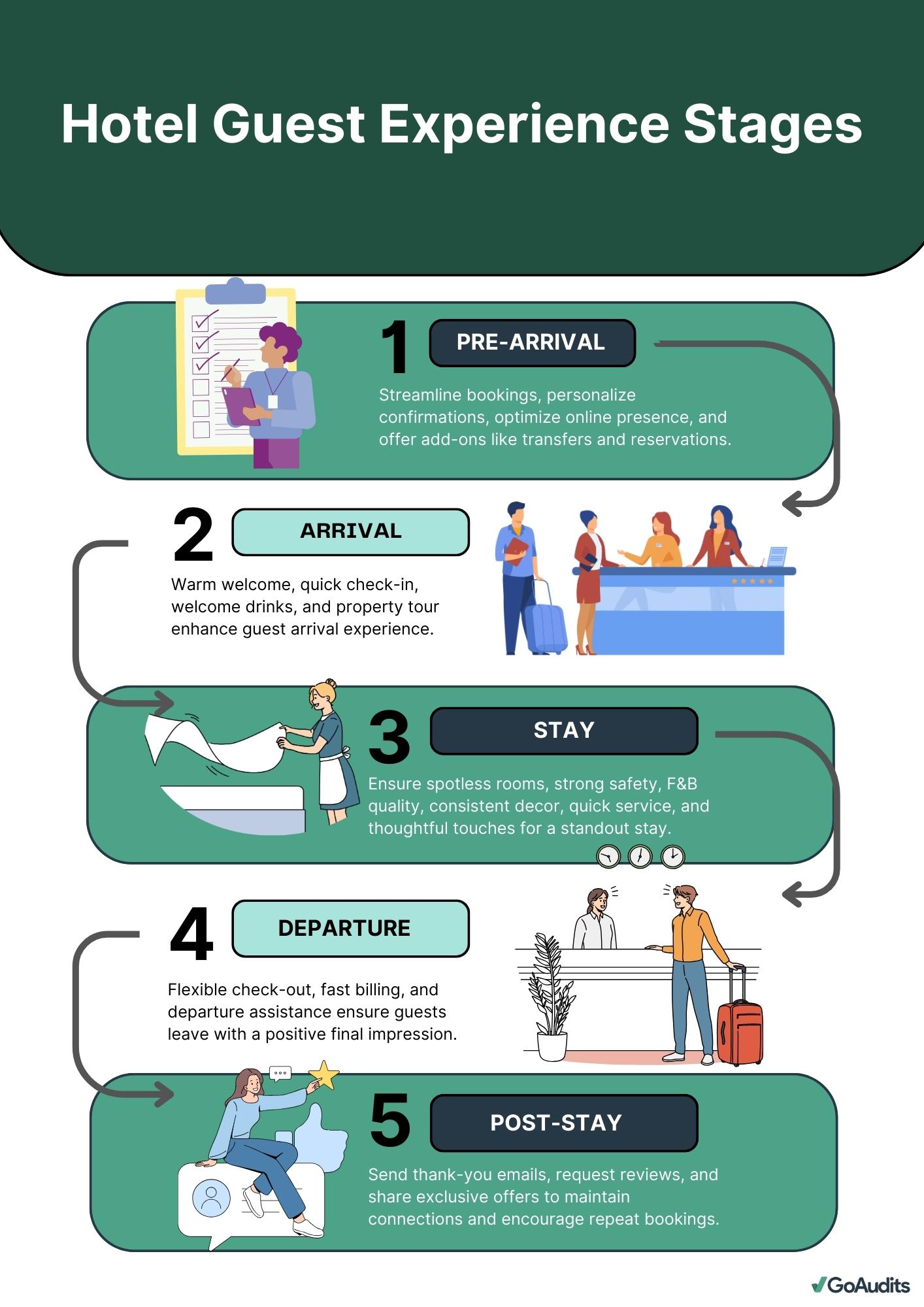Key Takeaways
- Guest experience directly impacts hotel profitability by shaping reputation, driving positive reviews, and bringing in repeat business.
- Inconsistent operational standards, poor compliance, and process inefficiencies can hinder businesses from delivering an excellent hotel guest experience.
- Hotel audit software help streamline operations through digital checklists and SOPs, efficient audits, and prompt corrective action management.
According to a PwC study, 73% of consumers say customer experience is a key factor in their purchasing decisions, yet only 49% say companies provide a good experience. For hotels, where guests expect comfort, service, and personalization at every touchpoint, the stakes are even higher.
Take personalization, for example. A survey by Deloitte revealed that personalized experiences can increase hotel revenue by up to 15%, as guests are willing to pay more for tailored services and experiences.
Read on to learn the multifaceted nature of guest experience in hotels and discover actionable strategies to enhance guest satisfaction across every touchpoint of the guest journey.
What is Guest Experience in Hotels
Guest experience encompasses every interaction a guest has with a hotel, from the initial booking process to post-stay follow-ups. It includes tangible aspects like room cleanliness and amenities, as well as intangible elements such as personalized service and ambiance. Hotel guest experience is more than customer service and includes:
- Digital interactions: Website usability, booking engine ease, pre-arrival communication.
- Physical environment: Hotel environment, cleanliness, décor, amenities, safety, and security.
- Human interactions: Staff friendliness, efficiency, responsiveness, and professionalism.
- Emotional connection: Feeling welcomed, valued, understood, and cared for.
- Process efficiency: Smoothness of check-in/out, service requests, billings, etc.
Why Customer Experience in Hotels Is Important
Guest experience in the hospitality industry directly impacts a hotel’s reputation, customer loyalty, and revenue. A positive guest experience can bring you repeat business and word-of-mouth referrals, both critical for your hotel’s long-term success.
A TripAdvisor Study found that 81% of travelers always or frequently read reviews before booking, and 8 out of 10 users are more likely to book a hotel with a higher rating when choosing between two identical options. The slightest increase in ratings on review sites like Google Reviews and Yelp can create a major impact on overall sales. As per a Harvard Business School Study, a 1-star increase on Yelp can contribute to a 5-9% increase in revenue. A memorable hospitality guest experience generates a high rating for your business and is more likely to bring new customers.
Director of Guest Experience: An Increasingly Common Position in Hospitality
Recognizing this critical role of guest experience, many hotel groups and independent properties have established dedicated leadership roles, such as the Director of Guest Experience at the C-suite level. The emergence of this position signifies the importance of delivering a smooth and positive journey for every guest.
Some of the key responsibilities of a Hotel Guest Experience Director can include:
- Guest-Centric Leadership: Guide overall guest experience strategy, ensuring every interaction aligns with the hotel’s brand and service standards.
- Cross-Department Strategy: Collaborate with other departments to shape marketing, operations, and revenue strategies that drive overall hotel performance.
- Service Quality Oversight: Develop and implement initiatives to enhance service delivery, from check-in to check-out.
- Team Coordination and Training: Oversee hotel staff training and performance, establishing a culture of continuous improvement and responsiveness to guest feedback.
- Personalization and Innovation: Utilize guest data and emerging trends to tailor services, integrating technology solutions that streamline and personalize the guest journey.
- Problem Resolution and Feedback Management: Address guest concerns proactively, ensuring issues are resolved quickly to maintain a positive reputation
Top 5 Factors Driving Positive Hotel Guest Experiences
Every point in the hotel guest journey is crucial, but some factors are more critical than others for a positive hotel guest experience. Based on the industry insights from AHLA’s 2025 report, the following 5 factors are often ranked highest by guests for a positive experience:

- Guest Room Cleanliness: Guests expect their private space to be impeccably clean, sanitized, and well-maintained. It’s fundamental to their comfort, health perception, and overall satisfaction.
- Property Cleanliness: The overall cleanliness of the hotel, including lobbies, hallways, elevators, dining areas, and restrooms, significantly impacts guest perception of quality and care.
- Security Measures: Guests need to feel safe and secure during their stay. Visible and effective security measures, including secure locks, adequate lighting, and clear emergency procedures, provide essential peace of mind.
- Quick, Easy Check-in/out Process: A smooth, efficient, and hassle-free check-in and check-out process respects the guest’s time and minimizes potential frustration, starting and ending the stay on a positive note.
- Friendly Staff: Warm, welcoming, and genuinely helpful interactions with staff across all departments can elevate the hotel guest experience significantly. Professionalism combined with approachability makes guests feel valued and well-cared for.
Ideas to Enhance Hotel Guest Experience Journey at Every Checkpoint
The hotel guest experience cycle starts even before the customer sets foot on the property and continues long after they check out. Let’s look at the five stages of the guest journey in a hotel and how to optimize each of them for a better guest experience:
1. Pre-arrival Experience
This encompasses all guest interactions happening before they physically arrive at your hotel. It starts from their initial research and booking process to pre-stay communication.
To enhance guest experience at the pre-arrival stage, ensure your online booking system is seamless and user-friendly. Additionally, confirm your property is well-mapped on Google Business Profile and can be easily found using Google Maps. Send out confirmation emails anticipating guest needs. Offer them convenient add-ons like airport transfers, activity bookings, or dining reservations.
2. Hotel Arrival Experience
The hotel arrival stage in the hotel guest experience journey marks their first physical interaction with the property and staff, covering their welcome, the check-in procedure, and initial moments within the property.
Focus on providing a genuinely warm and personal welcome the moment guests enter. Streamline the check-in process to be as quick and efficient as possible. Perhaps, offer mobile or self-check-in for guests to check in remotely.
Thoughtful welcome amenities, even small ones like a refreshing beverage or assistance with directions, can significantly improve hotel guest satisfaction. You may also ask guests if they would like a property tour to familiarize them with the hotel’s amenities.

3. Stay
A guest’s stay at your hotel has the biggest impact on their perception of the overall experience. This includes all interactions during their time at your property. Let’s explore ways to improve the guest experience in hotels for an exceptional stay:
a. Maintaining Clean Rooms and Common Spaces
Cleanliness consistently ranks as the top factor in improving guest satisfaction. Use standardized housekeeping SOPs that detail every aspect of room cleaning, from proper bed-making techniques to bathroom sanitization protocols.
Perform pre-arrival room checks using self-assessment checklists to solidify your housekeeping management efforts further. Public areas require equally rigorous attention, with scheduled cleaning of lobbies, elevators, and corridors multiple times throughout the day.
What truly elevates a property’s cleanliness reputation is its maintenance response system. When issues arise, swift resolution shows your hotel’s commitment to customer satisfaction and comfort. Conduct planned and random inspections of common areas to assess their conditions and maintenance needs.
Implement housekeeping software like GoAudits to create custom SOPs and self-inspection checklists, schedule inspections, and ensure all maintenance issues are addressed on time.
b. Upholding Safety & Compliance
Guest safety forms the foundation of trust between your property and visitors. Modern safety protocols extend beyond basic requirements.
- Conduct Regular Health and Safety Inspections: Schedule routine walk-throughs to proactively identify and mitigate potential hotel hazards throughout the property.
- Implement Fire Safety Measures: Equip the hotel with functional smoke detectors, clearly marked emergency exits, and regularly serviced fire extinguishers.
- Ensure Recreational Facility Safety: Regularly test water quality in pools and spas, inspect fitness equipment for proper functioning, and display clear safety guidelines in all recreational areas.
- Enhance Security Measures: Install secure door locks, strategically place surveillance cameras, and employ trained security personnel to provide a safe environment without infringing on guest privacy.
- Perform Thorough Safety Audits: Conduct well-documented safety audits to ensure adherence to local regulations and industry standards, addressing identified issues promptly to maintain a secure environment.
Leverage safety audit software to conduct detailed and efficient safety walkthroughs, internal audits, fire inspections, and other hotel safety checks, and hold staff accountable in case of negligence. Furthermore, proactive measures should be taken using corrective action features to fix the identified health and safety risks.
Hotel Safety and Security: How to ensure safety and security in the hospitality industry.
c. Ensuring Food & Beverage Excellence
The dining experience often creates some of the most memorable moments during a hotel stay. Excellence in this area requires attention to both safety and sensory satisfaction.
- Implement Food Safety Protocols: Adopt the Hazard Analysis and Critical Control Points (HACCP) system for identifying and controlling potential food safety hazards. This involves analyzing food production processes, pinpointing critical control points, and establishing measures to prevent risks.
- Utilize Detailed Kitchen and Professional Cleaning Checklists: Structured checklists for kitchen operations and cleaning routines promote consistency and thoroughness. These checklists should cover equipment maintenance, cleanliness of food preparation areas, and proper storage practices.
- Conduct Regular F&B Quality Audits: Periodic audits assess compliance with food safety standards and identify areas for improvement. Utilizing standardized audit checklists during these evaluations ensures a comprehensive review of all aspects of F&B operations, from procurement to service.
- Train Staff on Personal Hygiene and Safety Practices: Ensuring that all staff members understand and adhere to these practices minimizes the risk of contamination and enhances overall service quality.
Here are some important F&B checklists to help you assess the food quality at your hotel:
- Food Safety & Hygiene Checklist
- Bar Maintenance Checklist
- Restaurant Kitchen Cleaning Checklist
- Food Supplier Audit Checklist
- HACCP-Based SOPs
d. Adhering to Amenities and Decor Standards
Maintaining consistent amenities and décor standards is essential for reinforcing your hotel’s brand identity and ensuring a memorable guest experience.
Verify that all in-room features, such as lighting, appliances, and entertainment systems, are present and functioning correctly to meet brand expectations. Ensure a uniform aesthetic across the property that aligns with your hotel’s branding, creating a cohesive atmosphere that resonates with guests.
e. Responsive Service Delivery
How your team responds when something goes wrong often leaves a stronger impression than when everything goes right. Create a centralized system for tracking and fulfilling guest requests. Define clear response time expectations by request type—a broken air conditioner demands faster attention than a request for extra pillows.
Empower your front-line staff to make appropriate decisions without unnecessary escalation. Follow up after resolution to confirm satisfaction, demonstrating that your concern extends beyond the immediate issue.
4. Departure
The departure covers the guest’s final interactions within the hotel, primarily the check-out process and leaving the property. Enhance the hotel guest experience at this stage by offering flexible check-out options, catering better to guests’ travel schedules.
Implement a quick and simple billing process; ensure invoices are accurate, presented clearly, and processed efficiently to avoid delays. Offering assistance with departure arrangements, such as help with luggage or organizing transportation, provides a final gesture of care and convenience, concluding the stay on a high note.
5. Post-stay
Send timely and personalized follow-up communication, such as a thank-you email expressing appreciation for their visit. This interaction serves as an excellent opportunity to encourage guests to leave reviews on relevant platforms. Furthermore, send targeted special offers or exclusive promotions for future stays.
How to Improve Guest Experience in Hotels: Strategies & Best Practices
While optimizing each stage of the guest journey is crucial, certain overarching strategies and best practices form the bedrock of consistently delivering exceptional experiences. Implementing these across your operations can significantly elevate guest satisfaction, loyalty, and your hotel’s reputation.
1. Prioritize Housekeeping, Cleanliness, and Maintenance
As highlighted earlier, cleanliness is consistently ranked as a top driver of positive guest experiences. This extends beyond guest rooms to encompass all public areas, amenities, and back-of-house spaces. Immaculate conditions signal care, professionalism, and respect for guest well-being.
- Proactive Maintenance: Implement a preventive maintenance schedule for equipment, plumbing, electrical systems, and room fixtures. A well-maintained property prevents disruptions and discomfort.
- Rigorous Standards: Define clear, high standards for cleanliness and ensure housekeeping staff are thoroughly trained in 5S housekeeping principles and equipped to meet them consistently.
- Swift Response: Have clear protocols for addressing maintenance issues reported by guests or staff promptly and effectively.
Streamline your cleaning and maintenance with digital tools. The GoAudits housekeeping app and janitorial inspection software allow you to create detailed checklists and housekeeping SOPs, schedule routine inspections, and track task completion, ensuring nothing falls through the cracks.
Here are some important housekeeping SOPs and maintenance checklists to help you get started:
- Hotel Preventive Maintenance Checklist
- Hotel Maintenance Checklists
- Electrical Maintenance Checklist
- HVAC Maintenance Checklists
- CCTV Maintenance Checklist
- Elevator Maintenance Checklist
- Hotel Housekeeping Checklists
- Bathroom Cleaning SOP Checks
2. Optimize Front Desk Operations
As the primary point of contact, the front desk is pivotal in shaping guest perceptions. Focus on combining operational efficiency, like smooth check-in/out processes, with personalized, welcoming service. Well-executed front desk interactions significantly contribute to positive first and last impressions, setting the tone for the entire stay.
Hotel Front Desk Management: Explore our complete guide on how to streamline front office operations in hotels.
3. Offer Flexible Booking Policies
Less restrictive booking and cancellation policies reduce booking friction, ease guest anxiety, and can lead to increased bookings and goodwill. Review your current policies to ensure they are competitive and clearly communicated, and consider offering rate options with varying levels of flexibility to meet different needs.
4. Encourage Guests to Stay Longer with Value-added Deals
Making a longer stay attractive benefits both the guest and the hotel. Consider strategies like tiered discounts for longer stays, package deals bundling accommodation with amenities, or specific loyalty perks for extended visits.
5. Establish Brand Standards & Ensure Compliance Using SOPs
Consistency is key to building brand trust and managing guest expectations. Whether you operate a single boutique hotel or a multi-property chain, clearly defined hotel brand standards are essential. SOPs are the tools to achieve this consistency.
Document expectations for everything – from room setup and amenity placement to service protocols and staff grooming. Create clear, step-by-step instructions for critical tasks across all departments. Ensure all staff members are thoroughly trained on relevant SOPs and understand the “why” behind the standards.
Hotel SOPs: Discover how implementing digital SOPs boosts profit margins.
6. Conduct Regular, Comprehensive Hotel Audits
How do you know if your standards are being met and your SOPs are being followed? Regular audits are crucial for quality control, compliance, and continuous improvement.
- Verify Standards: Hotel audits provide objective assessments of whether operational practices align with established brand standards, safety regulations, and quality benchmarks (like those set by Forbes Travel Guide and LQA).
- Identify Gaps: They help pinpoint areas needing improvement, further training, or resource allocation.
- Ensure Safety & Compliance: Audits covering safety, hygiene, and security protocols are vital for mitigating risks and regulatory noncompliance.
Enhance Hotel Operations and Improve Guest Satisfaction With GoAudits
GoAudits hotel audit software is a digital tool that offers fully customizable features for hospitality businesses to operate effectively and efficiently. It allows managers to simplify and streamline intricate and repetitive hotel operations that directly impact the customer experience.
With GoAudits, you can:
- Create custom hotel checklists or access ready-to-use templates.
- Allow hotel teams to coordinate with each other to deliver an exceptional guest experience.
- Make sure SOPs are always accessible to staff through the GoAudits mobile app.
- Perform regular hotel audits for consistency, efficiency, and safety.
- Flag issues in real-time, initiate prompt corrective actions, and monitor their resolution.
With a rating of 4.8 stars on Capterra, GoAudits is trusted by some of the biggest brands like Hilton, Marriott, and Choice Hotels in the hospitality industry.
» GoAudits Reviews: Read how companies leverage GoAudits to meet standards and deliver consistent services across locations.






